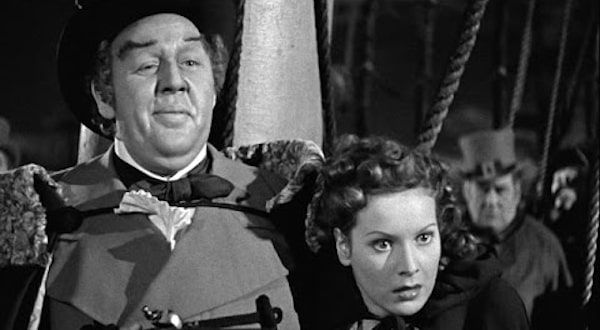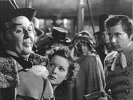Eye For Film >> Movies >> Jamaica Inn (1939) Film Review
Jamaica Inn
Reviewed by: Daniel Hooper

After the death of her mother, Mary (Maureen O’Hara) makes the trip from Ireland in search of Jamaica Inn, the place owned by her Uncle Joss (Leslie Banks) and, the aptly named, Aunt Patience (Marie Ney). A dark, foreboding building that provokes fear when mentioned to the locals of 1800s Cornwall, Jamaica Inn proves to be more than a setting; its twisting maze-like hallways parallel the structure of the film, while the building also provides the links between the initially disparate people.
Using the inn as his den of smugglers, the sinister Joss (Leslie Banks) acts as ringleader to a group of men who make-a-living sinking ships, killing the crew and taking the loot. Meanwhile, after being left stranded when her rider hears of her intended destination, Mary arrives at the inn with the help of landowner Sir Humphrey Pengallen (Charles Laughton) and finds herself the centre of attention from her creepy uncle Joss. After saving the enigmatic Trehearn (Robert Newton) from being hung by the gang of thieves, she is forced on the run from her relatives with the wanted man.

Charles Laughton’s Sir Humphrey proves to be the pivotal character of Jamaica Inn in more ways than one. A larger-than-life figure, literally and metaphorically, his presence dominates whenever he is on-screen - one suspects this was as much due to his role as producer as well as actor, though he is entertaining throughout. More interestingly, Sir Humphrey is both law of the land and the head of the criminal operation, a criminal with a respectable veneer: it is interesting to see this trait recur with the Robert Mitchum’s preacher-cum-psycho Harry Powell from the classic The Night Of The Hunter, the film Laughton would later direct.
As with other British-era Hitchcock films, the dialogue in Jamaica Inn is more verbose and theatrical than it is cinematic, a fact emphasised by the lack of an original soundtrack; thankfully Hitchcock’s visual flair more than makes up for these shortcomings. The opening sequence of a boat running aground is still technically impressive, while the inn set is rich in gothic charm, and a shot taken from the top of a masthead looking down onto a packed boat is hard to imagine being achieved by anyone but the gifted director.
As the last of his British-era films, Hitchcock supposedly found it hard working under Laughton’s command, while the author Daphne du Maurier hated the adaptation of her work (though she would be repaid in kind by the superior adaptations of Rebecca and The Birds). Though not the best of Hitchcock’s British work, Jamaica Inn, however, is an entertaining and surprisingly dark period drama. A twisting story which holds many surprises, Jamaica Inn hints at the genius to come later.
Reviewed on: 31 Aug 2008

















